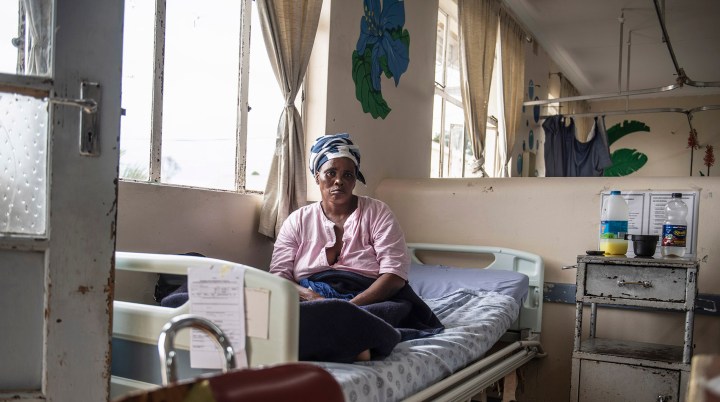BHEKISISA OP-ED
NHI – the problem with trying to kill two birds with one stone

The National Health Insurance scheme aims to simultaneously solve two problems – fixing poorly run health facilities and distributing the money available for healthcare in the country in a more equitable way. But trying to fix two things at once may make things worse.
As a resident of Nqileni village, about 100km from Mthatha, government health facilities have been my go-to for the past 20 years.
There are few private healthcare facilities in this part of the world – the closest private hospital is three hours’ drive away.
But I’m fortunate. I live within reach of two well-run state hospitals – about 20km from the Zithulele and Madwaleni district hospitals in the Eastern Cape.
Madwaleni, for example, offers 24-hour services, such as maternal and childcare with a neonatal high care unit, an accident and emergency unit, rehabilitation therapists, social workers and a registered counsellor and dietician. There are also surgical services such as tendon repairs, amputations and skin grafts, an on-site laboratory and X-ray facilities. Most people here get these good-quality amenities for free.
For things like childhood vaccinations and chronic medicine such as antiretroviral treatment for HIV, people in my community go to a local Bulungula Health Point run by an NGO, the Bulungula Incubator, in collaboration with the Eastern Cape health department. This project has taught me that even though inefficiency characterises much of the country’s public health system, there are also committed, hard-working government officials who work with a “can-do” attitude to give remote communities access to quality healthcare.
I’m therefore very much in favour of anything that will improve state healthcare, which is why the proposed National Health Insurance (NHI) scheme interests me.
I think it’s fair to say the NHI aims to solve two problems: how to improve badly run, underresourced public health facilities, and how to divide the money available for healthcare in the country in a more equitable way among South Africa’s people.
These are two worthy goals.
But in trying to solve both problems simultaneously, I fear it might actually make one of them worse.
Read more in Daily Maverick: After the Bell: Is South Africa being NHI-ed?
If we look at well-functioning government hospitals, such as the rural Madwaleni and Zithulele facilities in the Eastern Cape, or urban facilities like Groote Schuur in the Western Cape, the difference between these and struggling facilities isn’t resources – after all, health budgets are allocated nationwide using the same formula. Rather, the difference in quality between successful and failing state health facilities seems largely due to how they are managed.
What the NHI seems to be wanting to do is kill two birds with one stone. The NHI Bill, which is currently being debated in the National Council of Provinces in Parliament, has provisions for how hospitals will be better run using a system where health facilities will be decentralised but funds will be controlled nationally.
You might make things worse by giving incompetent or corrupt managers and dysfunctional administrative departments even more resources to squander.
Simultaneously, resources will be redivided, whereby money currently spent on private healthcare – in the form of medical aid premiums – will be spent on a one-tier health system, the NHI. (The bill makes it illegal for medical aids to exist in their current form – schemes will only be able to fund services the NHI doesn’t provide).
The plan is for a “phased implementation”, with the current first phase, which will end in 2026, and the second, which comes to a halt in 2028. While the bill is vague on how these phases are meant to unfold, the end point seems clear: a redistribution of funds from private healthcare into the public system and a similar redistribution of patients between public and private health facilities.
The trouble with more funding
Although those of us who work closely with the public health service naturally welcome the expected increase in public-sector funding, it is incorrect to assume that this will automatically improve badly run public hospitals. If you throw more money at them, things might look somewhat better for a while, but it would be just hiding the truth of the failing system of management.
In fact, you might make things worse by giving incompetent or corrupt managers and dysfunctional administrative departments even more resources to squander.
The NHI’s approach seems to avoid dealing with the difficult questions as to why some hospitals work well and some don’t.
Obviously, in the process of wasting a larger amount of money, there’s some good that will come of it. If a hospital is getting R1-billion and squandering 30% of it, and now you give it R2-billion and it squanders 30% of that, you still will see some improvement in the hospital. But there’s double the amount that is now being squandered.
I can’t help feeling that the sequence here has to be, first we fix public healthcare to a decent standard that is possible within the existing financial framework, and then move on to redistributing resources between the public and private health sectors.
Well-run hospitals like Madwaleni and Zithulele show that it’s possible to first fix public facilities with the resources we’ve got, instead of throwing more money at failing institutions.
Read more in Daily Maverick: We are unlikely to be equitably able to access lifesaving, affordable medicines under NHI
The NHI’s approach seems to avoid dealing with the difficult questions as to why some hospitals work well and some don’t. In its attempt to increase funding for public health, it avoids the bigger challenge of fixing broken management and administrative systems.
If you address both issues at once, you’ll never know whether you actually fixed the failing institutions with good policies and new management structures, or whether you just papered over the dysfunction by throwing more money at them… and in the process made everyone worse off.
The government says the NHI will bring about greater efficiency because a centralised system will be easier to run than our current nine provincially run public health systems or the more than 70 private medical schemes.
I can see that argument on paper. But I’m sceptical. Because whatever theoretical efficiency gains there are in administering one big scheme, these gains can be totally undermined by the extreme inefficiency we see in so many government departments and state-owned enterprises. New government agencies all aspire to replicate the efficiency of the South African Revenue Service but one must realistically consider the real possibility – and impact – of them evolving into the next SA Post Office or Passenger Rail Agency of South Africa. DM
Dave Martin is co-founder of a rural health and education nonprofit in the Eastern Cape. He writes in his personal capacity.
This story was produced by the Bhekisisa Centre for Health Journalism. Sign up for the newsletter.





















 Become an Insider
Become an Insider
I agree 100%. I work in a rural private pharmacy clinic, and see clients daily who are unwilling to go to one of two local clinics ( within 10km) because of stock issues, long waiting times or just Plain lack of caring. They would rather pay a small fee, and get fast, friendly services in a clean clinic where everything works.
Fixing the top-heavy management stucture, and getting nurses in who actually want to work, and care for their community is definitely the better solution. Enabling existing private providers, and using us to integrate with government services will ease their burden. Not punishing clients who choose to go to private practice because of guaranteed services without judgement. Not telling a young girls mom that her daughter is on contraception. Being the safe, Confidential space that is actually your duty as a health care provider!
Oooo, I get so worked up when I hear stories. And I hear many many stories from all ages, from young to old. It is sad and shocking, the lack of adhering to a clients human right to health care, no matter what age, race or sexual orientation they are. And my hands ate tried, because private providers may not refer to a government hospital. Client must go through entire clinic system, and hope they get helper before they surcum to the disease that ails them.